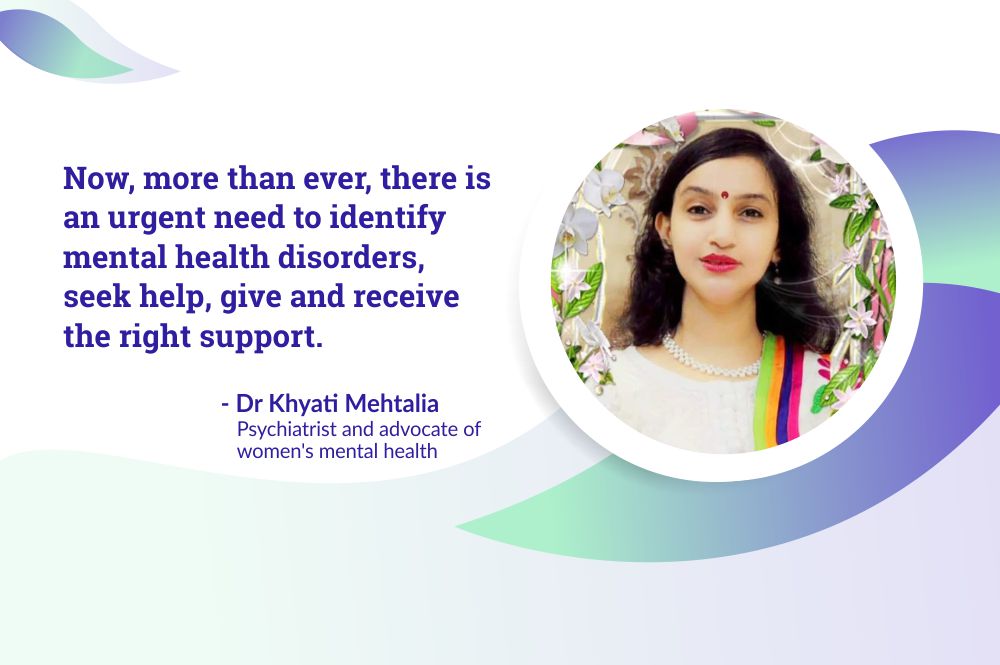- Home
- Healthcare Confronting Mental Health Disorders in Women


Confronting Mental Health Disorders in Women
27th May, 2021
The World Health Organization states that, “an estimated 73 million adult women worldwide suffer a major depressive episode each year.” In comparison to men, women are twice as likely to develop depression and anxiety. In a webinar on women’s mental health facilitated by Cadila Pharma in association with Ladies Circle (NGO)- Gujarat Chapter on April 27, Dr. Khyati Mehtalia, a psychiatrist and advocate of women’s mental health discussed mental disorders in women, the causes, and ways to address them. Ms. Geeta Johri, President – Special Duties, Cadila Pharma, was the moderator of the discussion. Below are the key learnings from the webinar:
Biological vulnerabilities
A woman’s biology makes her susceptible to vulnerabilities such as hormonal changes, Pre-Menstrual Syndrome (PMS), pre-menstrual dysphoric disorder in more severe cases and post-partum depression. Approximately 90% of all women suffer from PMS leading to crying spells, mood swings, irritability leading to arguments, conflicts, etc. Between 3-8% experience pre-menstrual dysphoric disorder. Women who experience post-partum depression i.e. depression after delivering a baby, lose interest in taking care of the baby and even develop suicidal thoughts.
Social vulnerabilities
Based on their gender and social conditioning, women often consider themselves inferior to their male counterparts hesitating to negotiate for higher salaries for example. They also feel pressured to fulfill the expectations of managing both work and family obligations. Thus women end up compromising on their own ambitions and desires to feel adequate as mothers, wives, daughters-in-law, professionals, etc. However, the pressure ultimately gives way to mental disorders like depression and anxiety.
Psychological vulnerabilities
Women have a ruminative cognitive style of thinking wherein they tend to overthink to an extreme. For example, after a confrontation with her husband, a woman may become very upset questioning why and how her husband reacted the way he did. Due to their psychological vulnerabilities, women are 2-3 times more likely develop depression and attempt suicide.
Indicators of mental health disorders
Dr. Khyati outlined some visible warning signs to help detect, diagnose and treat mental health disorders. These include loss of interest in pleasurable activities such as watching a movie, pursuing a hobby, deteriorating performance at work, oversleeping or getting very little sleep, loss of appetite or overeating, extreme weight gain or weight loss, dizziness, crying spells, suicidal thoughts, etc. Signs of acute anxiety are nervousness, chest pain, tremors and sweating of palms among others. The right time to seek help and professional attention is when these indicators begin to interfere in the personal, social and occupational spheres causing rifts in personal relationships, problems at the workplace, social isolation, suicidal thoughts, etc.
Challenges faced by persons with depression
Dr. Khyati identifies the lack of sensitization, awareness and understanding on part of the patient’s families as key challenges in addressing mental health. She said that very often, family members downplay mental disorders in women expecting women to cope silently. Women are castigated for having outbursts, but very little attention is paid to the causes for the same. It is crucial to generate public awareness and sensitization towards mental health and look at it as a public health issue.
Overcoming challenges to mental health
Mild symptoms of depression and anxiety may remit without medication; the concerned individual may spend time with friends, take a vacation, pursue a new hobby, etc. to overcome depression. However, moderate to severe symptoms or mild chronic symptoms need professional or psychiatric intervention wherein the psychiatrist meets the patient with their family and loved ones and sensitizes them about the situation and how to deal with it with psycho-education, mindfulness and compassion.
Dr. Khyati advises exercise, resuming hobbies, and ensuring sleep hygiene to effectively deal with stress on a daily basis. Particularly in the pandemic, she suggested that women must prioritize and delegate tasks and insist on sharing responsibilities with family members, domestic help, etc. Above all, she mentioned that women must accept that giving their 100% in everything is not possible or necessary. Lastly, if a woman takes care of her mental health, she will be happy and this will translate into a happy personal, social and professional life.
Disclaimer: The information presented in this blog is not intended to diagnose health problems or to substitute the professional medical care provided by your doctor. The information and reference materials contained here are intended solely for the general information of the user. It is not to be used for diagnostic or treatment purposes, rather, the users may use it to discuss with their own physician. The user of this website assumes all responsibility and risk for the use of this web site. Under no circumstances shall Cadila Pharmaceuticals Ltd. or its employees or its affiliates or anyone else involved in creating or maintaining this website be liable for any direct, indirect, incidental, special or consequential damages, or lost profits that result directly or indirectly from the use or inability to use the website and/or any other websites which are linked to this site – or that result directly or indirectly from mistakes, omissions, interruptions, deletion of files, viruses, errors, defects, or any failure of performance, communications failure, theft, destruction or unauthorized access.
Array ( )
To give you the best possible experience every time you visit our site, we use cookies to identify and store your preferences on your browser. Continuing to browse our site means that you are "ok" with this. Learn more about our privacy policy.
Okay


